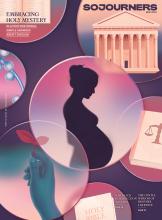SOON I WILL be stepping away from the church I co-founded 15 years ago. After the beautiful struggle of seeing it get rooted, Metro Hope Church remains a small but vibrant, justice-minded, multicultural community in the heart of East Harlem. Our reach continues to extend beyond our neighborhood throughout the city and to other parts of the country.
My reason for stepping away isn’t, thankfully, some scandal or health concern. Nor is it burnout (I’ve been there) from the pressures of keeping a church sustainable. Nor is it managing the diversity of cultures and personalities, nor even the heartbreak of seeing people leave. Nor is it even how pastors must, at the same time, draw from the resources of theology; management and leadership thought; and diversity, equity, and inclusion — all while navigating a dicey political climate.
Pastoral expectations can be flat-out overwhelming. But my reason for stepping aside is simply because the time feels right. Today, I’m able to pass the baton with much hope through a community that will continue to live out and pursue the good news of liberation and wholeness.
Read the Full Article

